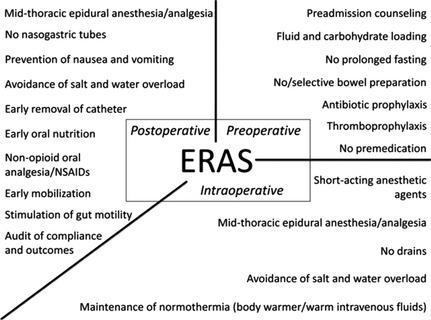|
What is ERAS?
Enhanced Recovery After Surgery (ERAS) is an evidence-based, patient-centred approach to the care of patients undergoing major elective surgery, based on 3 basic principles:
- Ensure the patient is in the best possible condition for surgery
- Ensure the patient has the best possible management during and after his/her operation
- Ensure the patient experiences the best post-operative rehabilitation
ERAS was originally developed in Denmark for colorectal surgery, but now widely adopted by the surgical community to include pathways for musculoskeletal, urological and gynaecological surgery.
Compared to traditional perioperative care, Enhanced Recovery After Surgery (ERAS) pathways represent a paradigm shift in the process of care, where multiple interventions are undertaken to minimise surgical stress responses, maintain physiological function and expedite return to baseline. To achieve this, ERAS adopts a multi-modal approach focusing on: minimally invasive surgical techniques, anaesthetic techniques, pain management, nutrition, fluid management and mobilisation. Examples of recommendations include carbohydrate drinks 2 hours before surgery instead of traditional overnight fasting, judicious fluid management rather than large volumes of intravenous fluids, avoidance of or early removal of drains and tubes and early mobilisation. Although each intervention may individually have a small effect, together they produce a much stronger synergistic effect.

Image from Karadhan et al
All these measures have been shown to reduce length of hospital stays by 30-50% (without increasing readmission rates), complication rates, narcotic use and costs.
Key Players
The Enhanced Recovery Partnership Programme (ERPP) is a partnership between the Department of Health, the National Cancer Action Team, NHS Improvement and the NHS Institute for Innovation and Improvement. Its aim is 'to improve the quality of patients care, through improving their clinical outcomes and experience, and reduce the length of elective care inpatient pathways across the NHS by utilising the good practice principles of the enhanced recovery model of care'.
An international working group within the Enhanced Recovery After Surgery (ERAS) Society for Perioperative Care develops evidence-based comprehensive guidelines for implementation of ERAS programmes:
- ERAS guidelines for gynaecologic/oncology surgery (pre- and intra-operative care)
- ERAS guidelines for gynaecologic/oncology surgery (post-operative care)
- ERAS guidelines for GI surgery: Part 1 and Part 2
- ERAS guidelines for elective colonic surgery
- ERAS guidelines for elective rectal/pelvic surgery
- ERAS guidelines for gastrectomy
- ERAS guidelines for pancreaticoduodenectomy
- ERAS guidelines for liver surgery
- ERAS guidelines for batriatric surgery
- ERAS guidelines for radical cystectomy for bladder cancer
- ERAS guidelines for major head and neck cancer surgery with free flap reconstruction
- ERAS guidelines for breast reconstruction
Each Trust should have their local ERAS policy for different operations.
References
Varadhan KK, Lobo DN, Ljungqvist O. Enhanced Recovery After Surgery: The Future of Improving Surgical Care. Crit Care Clin 2010; 26: 527-47.
Ljunggvist O, Scott M, Fearon KC. Enhanced Recovery After Surgery: A Review. Jama Surg 2017; 152(3): 292-298.
Author:
Ms Yanyu Tan
| Speciality:
General Surgery
| Date Added:
17/10/2018
|